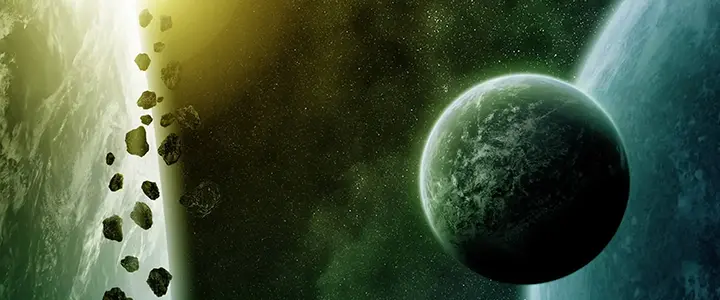The Expanse novels and novellas were part of my summer reading list for years. The nine book series initially takes place our own star system, with a focus on the stellar political situation.
Earth rules the star system, but martial-oriented (and slowly terraforming) Mars is a powerful countervaling force that seeks to usurp Earth’s position. Meanwhile, there are the Belters, humans who grew up in low to know gravity, but keep the solar system supplied with raw materials.
It’s a powder keg even without alien influence. Then the protomolecule shows up, alien technology that seeks to transform the worlds it infects and open interstellar gateways for its long dead masters.
Then protomolecule succeeds, seizing Venus and creating a gateway in the Sol system. From there, humans spread to hundreds of other star systems. The tensions these gates create – largely over who will control the gates – leads to all our war in the later books.
The novella, The Sins of Our Fathers, deals with the consequences of that war. It follows Filip Inaros, son of Marco Inaros, leader of one of the Belter factions and someone who will do (and actually do) anything to insure the prominence of his people.
We meet up with Filip in the aftermath of his father’s genocidal operations. The son is working as a contractor, helping new colonies become more established.
And then the gate dies and everyone on the planet he is currently visiting become separated from the rest of humanity.

Sins of Our Fathers
The Jannah system was one of over 1000 colonies settled by humans after the opening of the gates. Established with the assumption of resupply, the habitable world had two human bases – Alpha and Beta.
Philip is at Beta, and Beta has problem. The fledgling colony was setup in the path of huge, migratory monsters that didn’t care about (or even acknowledge) the humans. They slashed the settlement’s defensive wall, which set up a local debate about moving the colony’s or staying pat. It also empowered a bully who ignore the will of the people, a pattern that Philip know all too well thanks to machinations of his own father.
The novella is a good read and fitting epilogue to the Expanse series, and shows us that Phil has grown as a person. He makes a tough decision that not everyone in the colony agrees with and pays the price
As a kid forever in his father’s shadow – and with a father who did horrible things because no one was willing to stop him, Philip’s decision makes narrative sense … even if its not necessarily the one I would make.
More than anything, the novella made me miss the large Expanse series. It’d be great if the authors retuned at some point in the future, but unlike other series I’ve read (cough Wheel of Time cough) it ended when it should have ended.
Featured Image Meta
Cover art from Sins of Our Fathers. Credit: Hachette

